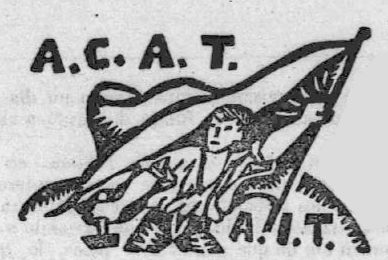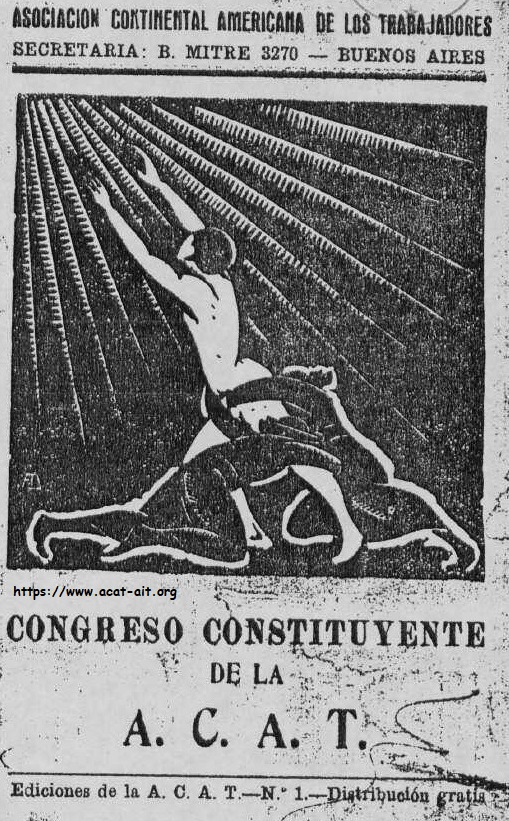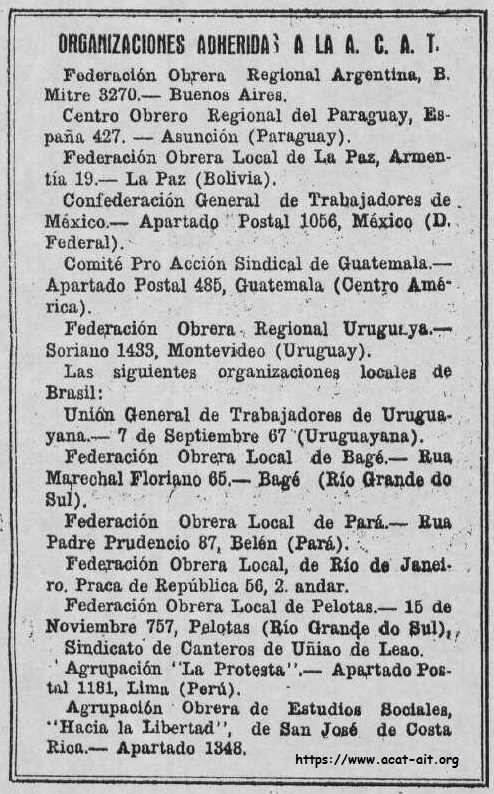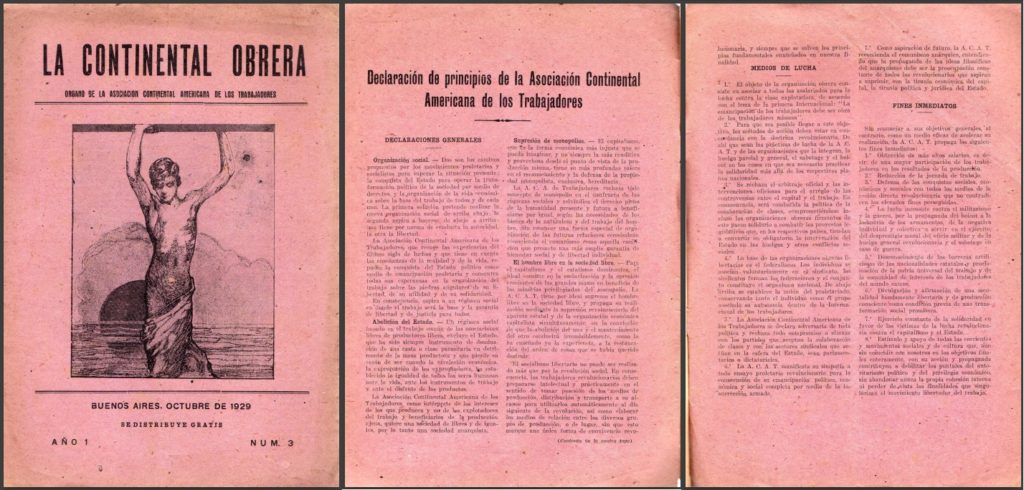
This is an excerpt from the declarations of the American Continental Association of Workers IWA-AIT from 1929. It consists of the principles and tactics adopted by the constitutive organizations drawn from Latin America at that time, and is translated into English [by] SN Nappalos.»
American Continental Association of Workers (ACAT)

Agreements and Resolutions of the Constitutive Congress Enacted in Buenos Aires 11-16th of May 1929
Declaration of Principles
General Declarations
SOCIAL ORGANIZATION- There are two proposed roads for socialist and proletarian movements to overcome the present situation: the conquest of the state to enact the political transformation of society by means of decrees, and the organization of economic life through the base of the work of each and all. The first resolution intends to realize a new social organization from top down; the second aspires to do it from below upwards; one has the norms of conduct of authority, the other liberty.
The American Continental Association of Workers, [La Asociacion Continental Americana de los Trabajadores, ACAT] recognizing the experiences of the last era of struggles and has taken into account the lessons of reality and life, repudiates the conquest of the political State as a means of proletarian emancipation and concentrates all its hopes in the organization of labor through the cornerstones of liberty and solidarity.
In consequence, it aspires to a social regime where labor will be the base and guarantee of liberty and justice for all.
ABOLITION OF THE STATE- Against the State, which has always been an instrument of domination of a parasitic class or caste in the detriment to the masses of producers and which lacks a reason to exist at the economic level, we call for a social regime based on common work of free associations of producers. The expropriation of the expropriators establishes the equality of all as human beings for living, for the means of labor, and for the enjoyment of its products.
ACAT, through support for the interests of those who produce and not the exploiters of labor and beneficiaries of alienated production, wants a free and equal society; therefore an anarchist society.
SUPPRESSION OF MONOPOLIES- Capitalism, which is the economic form most unjust that one can imagine, and not merely the most rich and profitable from the point of view of its own production, has as its deepest roots the recognition and defense of monopolist property, exclusive and hereditary.
The ACAT rejects all monopolist concepts in the usufruct of the rich, and demand the full right of present and future humanity to benefit equally according to necessity from the goods and nature of the work of humanity. Without recognizing a specific form of organization of future economic relations, it recommends communism as this condition that promotes the broadest guarantee of social welfare and individual liberty.
THE FREE PERSON IN FREE SOCIETY- The ideals of dominant capitalism and statism consist in slavery and increasing oppression of the largest masses for the benefit of the privileged minority of monopoly. The ACAT has as its supreme ideal the free person in free society, and spreads its realization through the revolutionary suppression of the state apparatus and capitalist economic organization simultaneously, with the conviction that the abolition of the one and the maintenance of the other will lead inevitably, in thought and experience, to the restoration of the order of things that we’re trying to destroy.
Libertarian socialism cannot be realized except by social revolution. In consequence, the revolutionary workers should prepare intellectually and practically in the sense of taking possession of the means of production, distribution, and transportation within our grasp to use them the first day of the revolution, as well as develop the means of relating the various groups of production or local, a necessary mark of our unique form of revolutionary coexistence and which conserves the fundamental principles stated in our ends.
Means of Struggle
1°. The object of the workers organization consists in associating the waged for the fight against the exploiting class in accord with the slogan of the 1st international “the emancipation of the workers will be the work of the workers themselves”.
2°. So that it will meet this objective, the method of action should be in agreement with revolutionary doctrine. In accordance, the practices of struggle of ACAT and the organizations that join will include the partial or general strike, sabotage and boycott in the cases in which it is necessary to practice the solidarity beyond the respective national planes.
3°. It rejects official arbitration and official interventions to settle conflicts between labor and capital. In consequence, there must be combat against the politics of class collaborationism, committing the adhering workers organizations of this pact to fight legislative projects that, in the respective countries, tend to convert into obligations of the intervention of the State in strikes and other social conflicts.
4°. The base of the libertarian workers organizations is federalism. Individuals associate voluntarily into the union [sindicato], the unions form the federations, and together constitute the national organism. From below to the top it establishes the union [unión] of the proletariat, conserving the individual as the group, associated for autonomy within the International of the Workers [IWA-AIT].
Organization by trade, by industrial branch, or by factory in the modern rationalized businesses, should be left to those effected the most. Federalism is a converging line of organizational conception that is not destroyed so long as it’s built out of immediate concreteness of interests on the field of a factory, village, or region, though taking into account that a human must first come to the environment in which they live as social being, and only after their role as producer.
5°. The ACAT declares opposition to all politics and rejects all compromise and alliances with the parties that accept class collaboration and the unions that work within the State, whether parliamentary or dictatorial.
6°. ACAT manifests its sympathy to all attempts of proletarian revolutionaries to attain complete political, economic, and social emancipation through armed insurrection.
7°. As a future aspiration, ACAT recommends anarchocommunism, understanding that the propagation of philosophical ideas of anarchism should be the constant preoccupation of all revolutionaries that aspire to overcome the economic tyranny of capital, the tyranny of politics, and law of the State.
[1] Rocker, R. (1938). Anarchosyndicalism: In theory and practice.»

Original in Spanish : DECLARACIÓN DE PRINCIPIOS ACAT-AIT [1929]
Em portuguese : Acordos e resoluções do Congresso Constituinte realizado em Buenos Aires nos dias 11 a 16 de maio de 1929.
